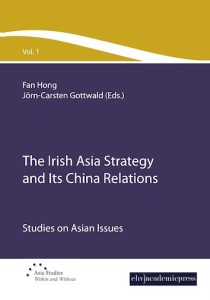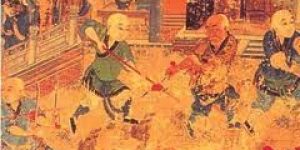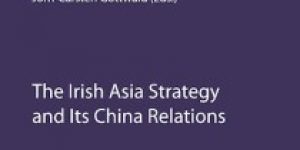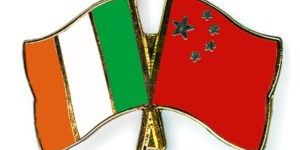Chapter 14: Ireland, China And The EU – Foreign Policy In A Europeanised Context ~ The Irish Asia Strategy And Its China Relations
No comments yet 14.1 Introduction
14.1 Introduction
The ever-expanding economic and political strength of China has garnered high levels of interest from the heads of the European capitals, including Ireland, over the past decade. Over the past deacde or so, a series of programmatic policy papers from the EU and bilateral agreements have established an increasingly institutionalised relationship. From the European perspecitve, China has provided a test of European strategy of constructive engagement, with the EU being characterised as a civilian, normative or soft power. Where, then, does Ireland fit into this framework? Since the early 1990s, Ireland has increasingly sought to engage China as part of its wider Asia strategy, which has involved meetings with heads of state, diplomatic conferences, as well as bilateral political dialogue on issues such as environmental protection, human rights and education policy. From these emerged one of the the most significant policy documents with regards China in Irish history, the Asia Strategy. This document laid out plans for business agreements, economic benefits and cultural dialogue between the two countries. It has been one of the most successful policies in relation to China and its relations between a member of the EU since 1985. In order to assess the relationship between Ireland and China, the wider context of EU relations with China must first be assessed. It will then become possible to understand the ever-growing relationship between China and Ireland on the individual level.
14.2 EU – China Relations: A Brief Overview
What is now called the European Union first officially recognised the government of the People’s Republic of China as the legitimate government of China in 1975 and concluded its first bilateral trade agreement in 1985. Since the 1980s, the European Union has developed its long-term relationship with China based on political, social and economic developments[i]. This has involved numerous diplomatic and political meetings and agreements that have included the signing of a Trade Agreement on April 3 1978, an EC-China agreement on textile trade signed on July 18 1979 and the creation of a delegation of the European Commission in Beijing on October 4 1988. However this relationship was not always as amicable as initially invisioned. Following the June 4 1989 incident in Tiananmen Square, relations cooled between the two, with the EC imposing a number of sanctions on China, including an arms embargo[ii]. It was not until October 1990 that the Council and European Parliament decided to gradually re-establish bilateral relations with China.
There was not much significant political activity between the two until the EU-China Energy Dialogue that was established in 1994 and as a result bilateral relations expanded at a rapid pace. In June of that same year a new bilateral political dialogue opened between the EU and China. This was accompanied, on July 15 1995, with the publication of the European Commission’s first official communication on China entitled ‘A Long-Term Policy for China-Europe Relations’. Increasing relations resulted in the creation of a Dialogue on Human Rights issues, which was released in January 1996. In 1998 the next official Communication was released by the European Commission entitled ‘Building a Comprehensive Partnership with China’. One of the most important bilateral agreements took place on May 19 2000 with China concluding a market access agreement with the EU, which was an essential milestone in China’s WTO accession process. The EU has opened its markets to China, since then, because of the benefits to its citizens as well as to obtain reciprocal market access. It has also used this as a way of promoting economic and political lineralisation within China. 2001 saw the European Commission publishing the Communication ‘EU Strategy towards China: Implementation of the 1998 Communication and Future Steps for a more Effective EU Policy’. This was followed by the March 1 2002 European Commission China Country Strategy Paper 2002-2006. On September 10 2003 the European Commission adopted a policy paper entitled ‘A Maturing Partnership: Shared Interests and Challenges in EU-China Relations’. This was followed, on October 13 of the same year, with China releasing its first ever policy paper on the EU. In March 2004 the European Union becomes the biggest trading partner of China, with China becoming the second largest trading partner of the EU. In February 2005 the first ever EU-China Financial Dialogue meeting was held. On March 20 2006 the first ever EU-China bilateral consultations with a focus on Climate Change Partnerships were held. October 24 of that year saw the Commission adopts its Communication entitled ‘EU-China: Closer Partners, Growing Responsibilities’, as well as a policy paper on trade and investment. Over the years the EU has become one of the most significant trading partners of China.
At present, there are over 24 policy areas that are subject to regular meetings between the EU and China[iii]. In official declarations, the relationship has been described as being ‘maturing’[iv], ‘comprehensive’, ‘strategic’[v] and ‘global’[vi]. The EU is supporting dual track meetings in the context of the ASEM process and within the bilateral relationship that has developed between itself and China. In responding to China as an emerging global superpower, the EU seeks to shape China’s international behaviour and domestic evolution based on EU norms and values. In addition to the official agenda of supporting the integration of the PRC into global politics, the EU is now also pursuing an agenda that is trying to change Chinese erceptions and behaviour. From the EU’s perspective, supporting China’s reform process turns into a subversive strategy to change China’s political and economic system. Although the EU has had a long-tern relationship with China, Ireland has become somewhat of a significant player in its own right. This relationship culminated with the development of Ireland’s Asia Strategy
1999-1990.
14.3 Ireland’s China Strategy
China’s rise has been seen as the world’s challenge, but as an opportunity for Ireland. Since the early 1990s Ireland, in the context of its wider Asia strategy, has increasingly sought to engage China in economic, political and social arenas. Ireland slowly began to strike up its own political rhetoric with China, separate from the EU, and in November 1996 saw the first meeting between Irish and Chinese heads of government, which took place between Premier Li Peng and Taoiseach John Bruton at the World Food Summit in Rome. The second meeting took place in 1998, at London’s Asia-Europe Summit Meeting, between Taoiseach Bertie Ahern and President Jiang Zemin and Premier Zhu Rongji[vii]. Ever since then relations have been growing at an ever increasing rate. Ever since then Ireland has been slowly building its levels of expertise on both the public and private sectors of China.
The government of Ireland first identified the need for a strategic approach to the development of trade relations with Asia in 1998. This was greatly influenced by the fact that in the future Asian countries, especially China, will have a strong influence on political and economic developments throughout the world. As a result, the Irish government decided to create a formal link between the two through which both the public and private sectors could work cooperatively. This, in turn, would enable them to realise the economic and political benefits that these linkages with Asian countries can offer. As a result, in 2004, the Asia Strategy was drawn up.
Since then there have been numerous policy documents that focus specifically on Chinese and Irish relations, the most well-known being the Asia Strategy 1999-2009. Many policy makers and academics over the years have asked why Ireland has become so interested in China, and the answer may be found in the following three reasons. Firstly, the rise of China on the global scale has affected, or will affect, almost every country in the world as it has become increasingly important, not only economically, but also politically and in terms of global security. Secondly, China has provided a huge economic opportunity for Ireland through market activities, Investment opportunities, as well as domestic income generation. Finally, no country can ignore the fact that China now matters significantly on a range of global issues in a way that was not the case two decades ago[viii].
As well as that Ireland’s ‘Celtic Tiger’ experience has a lot to do with the growing relationship with China. The economic growth witnessed by Ireland during this period created vast opportunities both internally and externally. As a result there was a need to expand its external engagement with the global market and China was seen as being the ‘best value for money’ model. The Celtic Tiger also resulted in Ireland becoming more politically and culturally self-confident and more pro-active internationally, which again meant that it opened itself up to new business and political ventures outside of the European Union. As it currently stands, the relationship between China and Ireland has never been economically stronger. Through the continuing involvement of Ireland in the political and economic developments of all Asian countries, a tangible business opportunity has arisen for companies in a range of economic sectors across the country.
Ireland has consistently expressed high levels of enthusiasm and confident expectations on the trade and development opportunities and possibilities that Asian countries, especially China, can offer. Ireland relies significantly on the export trade with China, as it is vital to increasing its foreign earning levels, creating jobs at home and sustaining the economic and social prosperity that was created during the period of the Celtic Tiger. Since the late 1990s, Ireland has been witness to a growing number of companies becoming interested in doing business with China, coming about mainly as a result of China becoming a feature on the world’s economic stage and of the government’s encouragement of Irish companies taking advantage of the opportunities that China has to offer.
The next phase of Ireland’s Asia strategy focuses on the development of trade with Asia with an aim to sustaining and reinforcing previous relationships and successes. Ireland has become dedicated to to working cooperatively with Asian countries in order to further develop trade and business there, with the aim being to progressively capitalise on the current trade opportunities. Recent developments include Ireland becoming a member of the Asian Development Bank, the main reason for doing so being to make advances in Ireland’s bilateral trade development programme in the region as well as making the most of any economic benefits that the membership may occur. However, there are also downsides to this expanding relationship. Ireland is seen as a late-comer in terms of European engagement with China. It does not have the long history and high levels of trust with China that the EU as a whole would have. Also the Celtic Tiger has been witness to a downturn and as a result there may now be more risks than opportunities for Ireland in this relationship.
14.4 The European Context
EU foreign policy towards China has come a long way since the first Trade and Cooperation Agreement was signed in 1985. Both political and bureaucratic cooperation mechanisms have become part of the institutional routine between the two that encompasses a whole range of governance-related policy areas that include technology transfers, climate change and international security. The EU recognises China as an increasingly important player across virtually international issues. However, the EU and China disagree on some of the most fundamental values of global governance including the creation and operation of multilateral institutions, the use of force and national sovereignty[ix]. Many of these areas were highlighted post-September 11 2001. Having observed these fundamental divergences of national interests between key EU member states vis-à-vis China, many critics are beginning to question the relevance of even having a common EU foreign policy towards China[x]. Yet, according to Ginsberg and Smith, these criticisms can often be attributed to an under-appreciation of institutional processes relative to other factors, such as material power[xi]. The main question here then is how does this affect Ireland and its relationship with China?
Ireland, since it joined the EU in 1973, has become deeply integrated both politically and economically with the EU. This is notwithstanding the recent debates surrounding Nice I and the Lisbon Treaty Referendum. As a result of this, Ireland’s external trade policy takes place in the overall context of the common EU trade policy, which covers both bilateral relations outside the EU and relations with the WTO. Ireland’s new policy of engagement with China, however, has not been as free and open as would have been hoped. The main reason being that it takes place in a deeply Europeanised context, even more so than it would have been 20 or even 10 years ago, and as a member of the EU Ireland must abide by any existing rules and regulations. As well as that, both the political and security dimensions of Irish foreign policy take place in the context of the CFSP and ESDP. Therefore Irish policy is limited by the rules and regulations of the EU. Many other important elements of Irish external policy and international policy development are also Europeanised, for example climate change policy under Kyoto and post-Kyoto treaties.
As a result, the majority of Ireland’s China policy, as is the situation for all other EU member states, has become extremely Europeanised through combinations of policies that aim to develop common EU policies with China. These Europeanised policies also aim to regulate the external dimensions or implications of any member state’s internal EU integration and development policies to that of the current standard of EU policies and regulations. This situation raises some important questions with regards Ireland’s China policy and its overall effectiveness given the dominance of the EU. Firstly, how does and can Ireland actually shape or contribute to EU China policy? Secondly, what does Ireland bring to the table with regards the EU’s China policy? Finally, how does the European (EU) context shape Irish policy i.e. does it strengthen or constrain it?
14.5 What Does Ireland Bring to European-China Policy?
With regard to the ever-growing relationship between Ireland and China, one has to ask what particular characteristics of the Irish political, economic and social experience does Ireland bring to the larger EU-China relationship and how can this be of benefit to overall China-EU relationship? The first benefit that Ireland has to offer comes from its history of economic expansion and growth. The period known as the Celtic Tiger transformed Ireland into a strong and independent country with a booming internal and external economic market[xii]. This experience can be translated into a blueprint that can be used to expand the current relationship with China as well as providing China with some key ideas that may enable it to form itself more along the lines of the EU market needs. The Celtic Tiger Ireland can be used as a model in numerous ways.
First, it can be used as a successful model of how a country can develop economic growth from relative poverty, a key problem in many areas of China at the moment. Secondly, Ireland developed its economic framework with the combined elements of social solidarity and social partnership. Both of these elements have become somewhat of a norm across European nations and China could use this to further integrate itself with these EU member states in the areas of cultural development and market structures. However, it must be noted that although China’s socio-economic and political scale are obviously very different from Ireland’s, Ireland can still provide elements of a model to which China might aspire. This may seem far-fetched but China still has a long way to go if it is to fully develop complete political, social and economic links with Europe and using the Irish model may allow it to develop these ties at a more rapid pace. Apart from this Ireland also has many more specific strengths that it may have to offer the broader EU-China relationship.
Education policy has been one of Ireland’s strongest weapons as an EU member and this could be used to further develop the cultural and education links in place between the EU and China. Ireland already has one of the highest exchange rates in colleges with China and this policy could further be expanded across the European Union. Another area of interest to China would be the pharmaceutical and bio-technology area. Ireland again has a lead in this field among the other EU members with the highest concentration of pharmaceutical companies choosing Ireland as a base, especially those from the US. All of these areas were dealt with in-depth in the Asia Strategy where the aim was to ensure that the Government of Ireland and Irish enterprises would work coherently to develop their relationship even further. As a result of that strategy the diplomatic and trade representation of Ireland has been strengthened through the opening of a Consulate General in Shanghai.
The adoption of this Strategy has also enabled trade between the two countries to increase considerably. Education has been another area greatly improved through this work with Ireland now attracting significant numbers of students from China. As a result of Ireland’s growing interest in China, China has reciprocated and has begun to view Ireland as a viable partner in the global economic, political and social marketplace. On numerous occasions, Chinese heads of state have noted Ireland’s economic growth records and its overall economic achievement. As well as that, China has taken an interest in the fact that Ireland has become a leading European knowledge-based high-tech economy with a strong track record of achievements in the areas of software development, information technology in general and life sciences[xiii]. All of these areas being of key interest to China and the Chinese market. Ireland has also been, as mentioned earlier, a key and active player within the European Union and one that has expanded its regional development policies on a large scale over the past 10 years.
These areas, along with the fact that Ireland has been one of the main EU member states to develop a healthy and positive relationship with China aided by regular visits, means that China sees Ireland as a powerful player in the international EU-China relationship. As stated by President Mary McAleese relations between China and Ireland are not only deepening, they are also widening. Ireland is not taking the steps to further develop its Asia strategy to encompass the next 25 years of relations with China. This will involve developing plans to boost the political, cultural, educational, and commercial and trade relations between the two countries. As of now the relationship between China and Ireland is flourishing.
One of the main signs of this deep-set bilateral relationship has been the development of dialogues focused on a wide range of issues, including education and economics. Ireland’s key political areas: a policy of economic expansion, greater access to education, recognition of economic interdependence, effective regional economic policies and the promotion of trade, encouragement of foreign direct investment and the diversification of markets, means that it has a lot to offer China in terms of internal policy development. The European Union has been one of the most important factors to Ireland’s success. Through its economic and social mechanisms, as well as the access that it provided to European markets, it allowed Ireland to evolve through its process of economic and social transformation. The EU agricultural, regional and structural policies were also of great importance in assisting Ireland to develop its national economy, as was the EU support of Irish national policies as a whole. However, this was not a one-sided relationship and Ireland is also extremely important to the EU. Ireland may be one of the smallest member states but it has a clear and influential voice within the Union, as was witnessed with the Nice I and Lisbon treaties.
14.6 How Does the EU Shape Irish Policy?
Ireland may have a significant role to play in the EU and its China policy, but the real question is does the EU context strengthen Irish policy towards China or undermine it? Well firstly this is an extremely sensitive question to answer because of the context of Irish neutrality. Taking the first question of whether or not the EU context strengthens Ireland’s China policy, one could argue that it does as it combines Irish power with the larger collective EU power therefore making one voice into many. This means that there is more power behind decisions and China will pay more heed than it would had Ireland itself developed a policy or recommendation. Irish governments have argued on numerous occasions in the past that EU policies are compatible with Irish neutrality and actually strengthen Irish influence, which otherwise would have been limited to that of a small, insignificant state.
However, there seem to currently be more arguments for the second reason, which is that the EU context actually constrains Ireland. This comes from the viewpoint that the EU weakens Ireland’s independence and freedom to manoeuvre within its China policies due to the fact that many voices against one usually means that the one falls into line with the many. This has happened on numerous occasions in the case of Ireland and the EU with regard policy and treaty developments, the most recent being Nice I and Nice II where Ireland was forced to hold a second referendum on an issue it has previously voted no to. Critics have argued that EU policy is dominated by the larger EU member states and has a neo-imperial or militarist agenda, whether this being explicit or implicit. This then comes back to Ireland’s neutrality issue. Since neutrality is an open-ended concept and the debate is deeply politicised and subjective, a decisive answer to this question is not really possible to ascertain. Therefore, to the outside it would seem that the institution of the EU is a dominant monster that does not let all of its member states have equal say.
Ireland has, however, been able to separate itself in the area of its China policy and the following evidence shows that Ireland has been able to increase its influence with China instead of it decreasing due to EU pressure. Ireland has not had to give up or surrender any of its pre-existing China policy nor any of its national policies towards China in the context of wider EU policy. Overall, EU policy on China has been largely compatible with Irish policy[xiv]. Both EU and Irish policy has tended to focus primarily on economic opportunities and threats that may result from the relationship with China and has decided to take a low-key approach on the human rights issue, unlike the US. As a result critics argue that the EU and Ireland are allowing economic self-interest to trump the concerns over human rights. There may be some truth to this argument but it does not imply that, in the case of Ireland, the primary reason for this has been the subjugation of Irish policy by the EU. In fact Irish governments and businesses have been advocates of this policy favouring it as it provides more benefits to their relations.
14.7 The Chinese Perspective
With regard to the EU as a whole, China understands that the relationship it has is a two way process. China is engaging the EU as much as the EU is engaging China. However, in addition to the straightforward economic interests displayed by the EU, for example market access, and as opposed to the EU’s implicit objective of shaping China’s domestic transformation, China has taken a different route. It has, instead, decided to follow a traditional realpolitik strategy of encouraging Europe to establish itself as a global power in order to counter balance US dominance. In China’s view, the EU is seen as being a potential temporary ally in the race for global supremacy instead of a partner for addressing global problems. How, then, does China see Ireland as an individual member of the EU? China sees the EU as a very valuable source of high technology, capital and intelligence, all of which are vital if China is to fulfill its historical mission of developing the Chinese nation and leading China into a position of global leadership.
As Irish and Chinese relations develop it becomes necessary to understand not only how Ireland perceives China in the Asian context but how China views Ireland in the European context. Ireland is currently categorised as being part of the larger economic opportunity that is presented to China by the EU. However, Ireland’s potential is growing and it is slowly becoming a source of foreign investment for China as well as a source of technological development, advancement and growth. Also Ireland has to offer a source of education opportunity for Chinese students seeking an education in the EU. Ireland appears to be one of the more attractive countries for Chinese students seeking higher education levels, thus creating a market between the two countries that has the dual benefits of education for the Chinese and funding for the Irish.
China views Ireland as a friendly face within the EU. China sees Ireland as being somewhat of a ‘kindred spirit’ with regards their common historical experiences with imperialism, thus the relationship is more open that it would be with other EU member states giving Ireland an advantage[xv]. With regards Ireland’s position within the EU, China understands that Ireland has a moderate centrist voice when it comes to policy development and implementation, marketing decisions and economic advancement. However, China still views this as significant and understands that even though Ireland may not have as much power as countries such as the UK, it still has a large enough say to ‘hold the EU hostage’, as has been witnessed with the Lisbon Treaty and Nice I. Also China views Ireland as being less critical of its human rights issues than countries such as Scandinavia or other Central and Eastern European EU member states. This means that Ireland has closer links with China and a first-place benefit when it comes to policy development.
14.8 Conclusion
Ireland’s China policy has been developed over time primarily as a response to the rise of China in the economic, political and diplomatic realms. It has also been primarily driven by, and reflects, the economic interests and opportunities that could be gained from a relationship with China separate from that which takes place in the EU. Ireland understands the enormous opportunities that China’s increasing global importance could result in for them both economically and politically. However, many critics argue that Ireland has been blinded to the negative aspects of a relationship with China by the Celtic Tiger economic outlook that developed throughout the late 1990s and has not taken into account areas such as human rights violations in the market development area. Many counterclaim that this is just a reflection of Celtic tiger Ireland’s new and more updated international view and that a relationship with China means a more self-confident and activist Ireland both internally and internationally.
China is trying hard to distance the EU from its own core values. If both the EU and China are going to continue to pursue their current agendas of changing the value base and institutions of each other, the emerging tensions are likely to remain. This is where Ireland may have the upper hand. However, even though Ireland and China have a growing relationship, Ireland’s China policy is still extremely Europeanised in the context of the EU and this will not change in the near future. With the growing feeling of Euro-scepticism and the primary results of Lisbon, Ireland may be pushing for a more individualist stance with regards its foreign affairs than it had over the last decade. However, Ireland being in a half-way house in the EU or even withdrawing completely is probably highly unlikely. The chances are that it will fall in line with EU policy while keeping its options open with China in areas such as education.
The overall European context of Irish EU policy with regard to China emphasises the political dimensions of the Ireland-China relations in three main areas. Firstly, it makes it part of a larger geo-economic and geo-strategic relationship in the EU-global context. Secondly, it means that the human rights questions can no longer be avoided on Ireland’s part and that it will inevitably have to fall in line with current EU policy regarding human rights violations and China. Finally, it relates to the larger questions such as global warming and proliferation of WMDs and other nuclear technology. Therefore, it can be argued that although Ireland contributes to EU China policy, the opportunity to be more proactive in exploring what particular things Ireland brings to the table and how it can contribute to EU policy can and should be taken.
NOTES
[i] EU-China Political and Economic Relations Handbook 2007 USA International Business Publication.
[ii] Asia Monitor Research Centre EU-China Economic Relations 2000
[iii] Cassarini The Evolution of the EU-China Relationship: From Constructive Engagement to Strategic Partnership 2006.
[iv] European Commission 2006.
[v] Wen Jiabao Speech 2006.
[vi] European Commission 2007.
[vii] http://www.einnews.com/china/newsfeed-china-ireland
[viii] Stanley Crossick China-EU: A Common Future 2008.
[ix] EU-China Political and Economic Relations Handbook 2007.
[x] Richard Edmonds China and Europe Since 1978: A European Perspective 2002.
[xi] EU Foreign Policy Towards China http://www.gppi.net/research/eu_china_policy/
[xii] ‘Ireland’s Economic Miracle Celtic Countries Magazine 2004. http://celticcountries.com/webmagazine/economy/celtic-tiger/
[xiii] DETE: A Decade of the Asia Strategy 1999-2009. http://www.entemp.ie/trade/bilateral/asiastrategy.htm
[xiv] Ireland and the EU- European Commission. http://ec.europa.eu/ireland/general_information/ireland_eu/index_en.htm
[xv] David Shambaugh Chine-Europe Relations: Perceptions, Policies and Prospects 2008
You May Also Like
Comments
Leave a Reply








